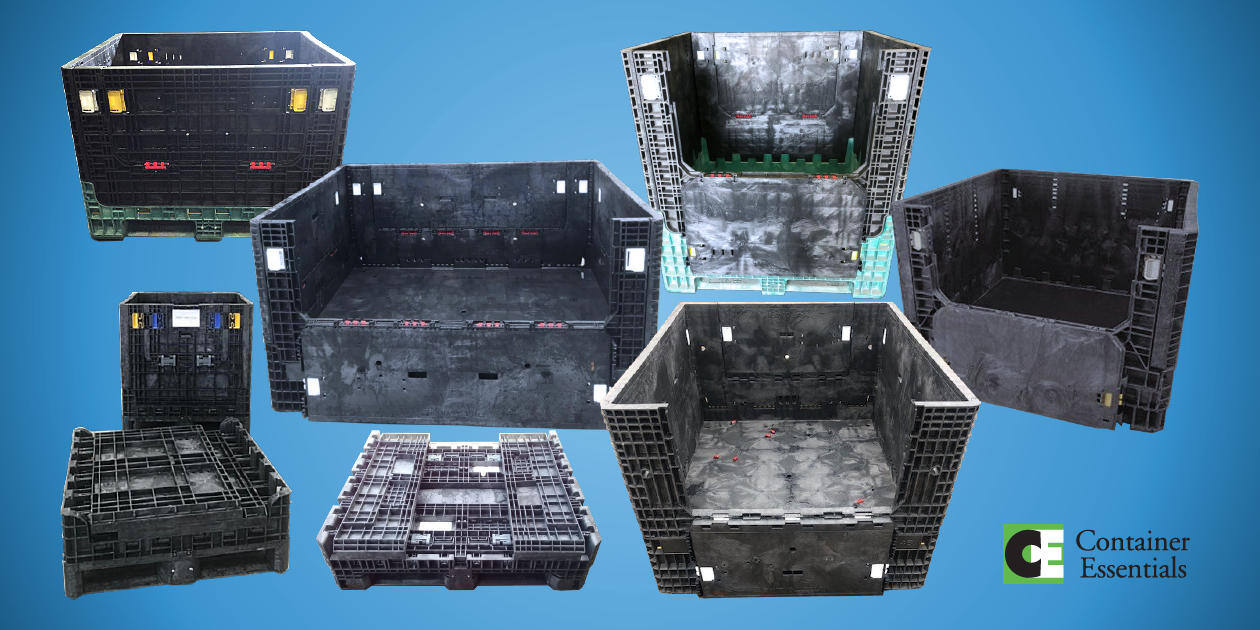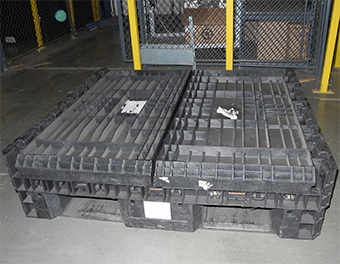The Ultimate Guide to Selecting the Right Bulk Containers for Your Company Requirements
Picking the suitable bulk containers is crucial for any type of service that counts on reliable logistics. Different kinds of containers exist, each designed for specific products and applications. Aspects such as dimension, material compatibility, and regulative criteria play a significant duty in this decision-making process. Understanding these aspects can lead to enhanced operational effectiveness. Lots of services overlook important facets that could boost their total efficiency and sustainability. What are these considerations?
Understanding Different Kinds Of Bulk Containers
Mass containers act as important devices for organizations seeking efficient storage and transport solutions. These containers are available in different kinds, each designed to satisfy particular functional demands. One usual kind is the intermediate mass container (IBC), which is ideal for liquid and granulated materials, providing a balance of ability and ability to move. An additional prominent option is the bulk bag, or FIBC, appropriate for completely dry, flowable items. These adaptable containers are light-weight and can be conveniently delivered and saved. For larger materials, stiff mass containers are typically employed, providing longevity and security for secure handling. Additionally, there are specialized containers tailored for harmful materials, making sure compliance with security guidelines. Understanding the distinct attributes of these mass container kinds permits businesses to make enlightened decisions that maximize logistics and minimize prices. By choosing the ideal container, companies can boost their operational performance and simplify their supply chain processes.
Trick Product Considerations for Bulk Containers
When choosing mass containers, it is vital to contemplate the products used in their construction. Aspects such as resilience, chemical, and toughness compatibility play a crucial duty in ensuring the containers fulfill specific functional requirements. In addition, weight and transportability issues can influence both effectiveness and transportation logistics.
Product Resilience and Stamina
Toughness and toughness are critical elements in selecting products for mass containers, as they directly affect the container's ability to withstand different environmental problems and managing procedures. Products such as high-density polyethylene (HDPE), polypropylene, and stainless steel are typically favored for their robust properties, offering resistance to temperature, effect, and abrasion changes. The choice of material additionally influences the general life-span of the container; more powerful materials typically lead to less frequent substitutes, causing cost financial savings gradually. Additionally, the weight of the product can influence delivery prices and convenience of handling. Companies should consider their certain functional settings and the possibility for deterioration to ensure peak sturdiness and strength in their bulk container choice.
Chemical Compatibility Aspects
Recognizing chemical compatibility is essential for selecting mass containers, as the products used must stand up to the details materials they will certainly hold. Different aspects affect compatibility, including the chemical nature of the components, temperature level, and period of storage. Destructive chemicals might require containers made from stainless steel or specialized plastics that stand up to destruction. In addition, responsive materials can produce warmth or gases, necessitating vented or pressure-rated containers. The choice of container material, whether metal, polyethylene, or polycarbonate, must straighten with the chemical residential properties of the kept compounds to avoid leaks or breaches. Inevitably, a thorough evaluation of these compatibility variables guarantees safe handling and storage space, safeguarding both employees and the atmosphere while keeping item honesty.
Weight and Portability Issues
Selecting bulk containers involves not only examining chemical compatibility yet additionally taking into consideration weight and portability. Organizations should assess the ease of handling and transport to enhance efficiency. Lightweight materials like high-density polyethylene (HDPE) or aluminum can help with less complicated movement and minimize delivery costs. Alternatively, much heavier containers might supply enhanced resilience however can impede wheelchair, especially in environments needing constant moving. In addition, the design of the container need to enable for convenient lifting and stacking, making sure ergonomic safety and security for workers. Business must additionally consider the facilities readily available for transportation; as an example, containers compatible with forklifts or pallet jacks can simplify procedures. Ultimately, the best equilibrium between weight and portability straight influences operational effectiveness and cost efficiency.
Sizing Your Bulk Containers for Ideal Effectiveness
When sizing bulk containers, companies need to carefully evaluate the dimensions needed to suit their particular products. In addition, weight capacity is a vital variable that affects performance and safety during transportation and storage space. Efficient sizing not just optimizes room however likewise maximizes functional process.
Determining Container Dimensions
Picking the appropriate dimensions for mass containers is vital for making best use of performance in storage and transportation. Organizations have to analyze their details requirements, taking right into account variables such as offered space, the nature of the goods being stored, and the methods of transportation utilized. Accurate dimensions ensure that containers fit ideally in storage facilities get more info and lorries, minimizing thrown away space and minimizing handling time. Standard dimensions can provide ease, however customized dimensions may be essential for one-of-a-kind needs or to fit specific items. Furthermore, it is vital to evaluate stacking capabilities and access, as these elements influence general operational performance. Eventually, the appropriate dimensions result in boosted company and structured logistics, profiting the overall efficiency of business.
Weight Ability Considerations
Comprehending weight ability is crucial for businesses intending to maximize their bulk container effectiveness. The weight ability of a container directly influences storage capacities, transport logistics, and general functional costs. Choosing containers with the proper weight limitations ensures that companies can safely keep and carry their goods without taking the chance of damage or compliance issues. Overloading containers can lead to architectural failures, while underutilizing capacity lead to thrown away resources. When choosing containers, it is important for services to examine their product weights and think about any type of regulatory needs. Furthermore, aspects such as the kind of product, meant usage, and environmental conditions ought to additionally affect weight capability choices. By assessing these components, services can enhance effectiveness and guarantee a structured supply chain.
Regulative Conformity and Security Requirements

Regulative compliance and safety and security criteria play a vital duty in the selection of bulk containers for businesses. Organizations has to assure that their containers fulfill different regulations established by neighborhood, national, and international authorities. These requirements frequently relate to product safety, architectural stability, and correct labeling, which aid stop crashes and ensure the secure transport of goods.
Additionally, adherence to industry-specific guidelines, such as those from the Fda (FDA) or the Occupational Security and Wellness Management (OSHA), is critical for firms handling dangerous materials or food products. Non-compliance can cause fines, lawful issues, or damage to a business's track record.
Organizations should likewise consider the container's compatibility with the materials being saved or moved to avoid contamination or chain reaction (refurbished bulk containers). To sum up, understanding and executing regulatory conformity and safety requirements is necessary for the effective and responsible usage of mass containers
Sustainability Options for Eco-Friendly Bulk Containers

Companies are likewise checking out choices made from recycled products, which not just preserve resources however likewise sustain the reusing market. Moreover, developments in style enable for lighter containers that require much less energy to transportation, better improving sustainability. By incorporating these eco-friendly bulk container alternatives, businesses can show their dedication to ecological stewardship while meeting consumer need for sustainable techniques. This shift not just helps the world however can also enhance brand online reputation and client loyalty.
Cost-Effectiveness and Budgeting for Mass Containers
While numerous organizations concentrate on sustainability, cost-effectiveness remains a crucial aspect when selecting bulk containers. Organizations needs to analyze the first purchase price, as well as long-term functional costs, to ensure economic viability. Factors such as sturdiness, reusability, and upkeep play a considerable function in determining general expenditures.
Purchasing high-grade containers might generate greater in advance expenses yet can lead to savings through decreased substitute rates and decreased waste. Furthermore, businesses should think about transportation prices and storage performance, as these can impact the total spending plan.

Often Asked Inquiries
Exactly how Do I Determine the Right Container for Hazardous Products?
To identify the right container for unsafe materials, one have to examine compatibility with the compound, take into consideration the container's product, look for regulative compliance, and examine capability and security attributes to assure correct handling and storage space.
Can Mass Containers Be Customized for Particular Products?
Yes, bulk containers can be personalized for particular products. refurbished bulk containers. Various features, such as size, product, and style, can be tailored to fulfill distinct requirements, making certain ideal safety and security and efficiency for moving and saving different items
What Is the Average Lifespan of Various Bulk Container Types?
The ordinary life-span of bulk container types differs; plastic containers last 5-10 years, metal containers 10-20 years, and wooden containers usually last 3-7 years, depending on use, maintenance, and ecological problems.
Just how Should I Clean and Maintain Mass Containers?
To clean and keep bulk containers, one ought to routinely inspect for damages, eliminate deposit, clean with suitable detergents, wash thoroughly, and warranty correct drying out prior to storage space. Complying with maker standards improves long life and safety during use.
Exist Rental Choices for Bulk Containers Available?
Yes, various firms offer rental alternatives for bulk containers, providing adaptability for organizations. These services can accommodate various demands, permitting firms to take care of inventory effectively without the commitment of purchasing containers outright.
Durability and strength are important variables in selecting products for bulk containers, as they straight affect the container's capability to withstand various environmental problems and taking care of processes. Recognizing chemical compatibility is vital for selecting mass containers, as the materials used must stand up to the particular materials they will certainly hold. Recognizing weight capacity is essential for companies intending to enhance their mass container effectiveness. Regulatory conformity and security requirements play a necessary role in the selection of mass containers for companies. While several businesses focus on sustainability, cost-effectiveness stays an essential element when selecting bulk containers.